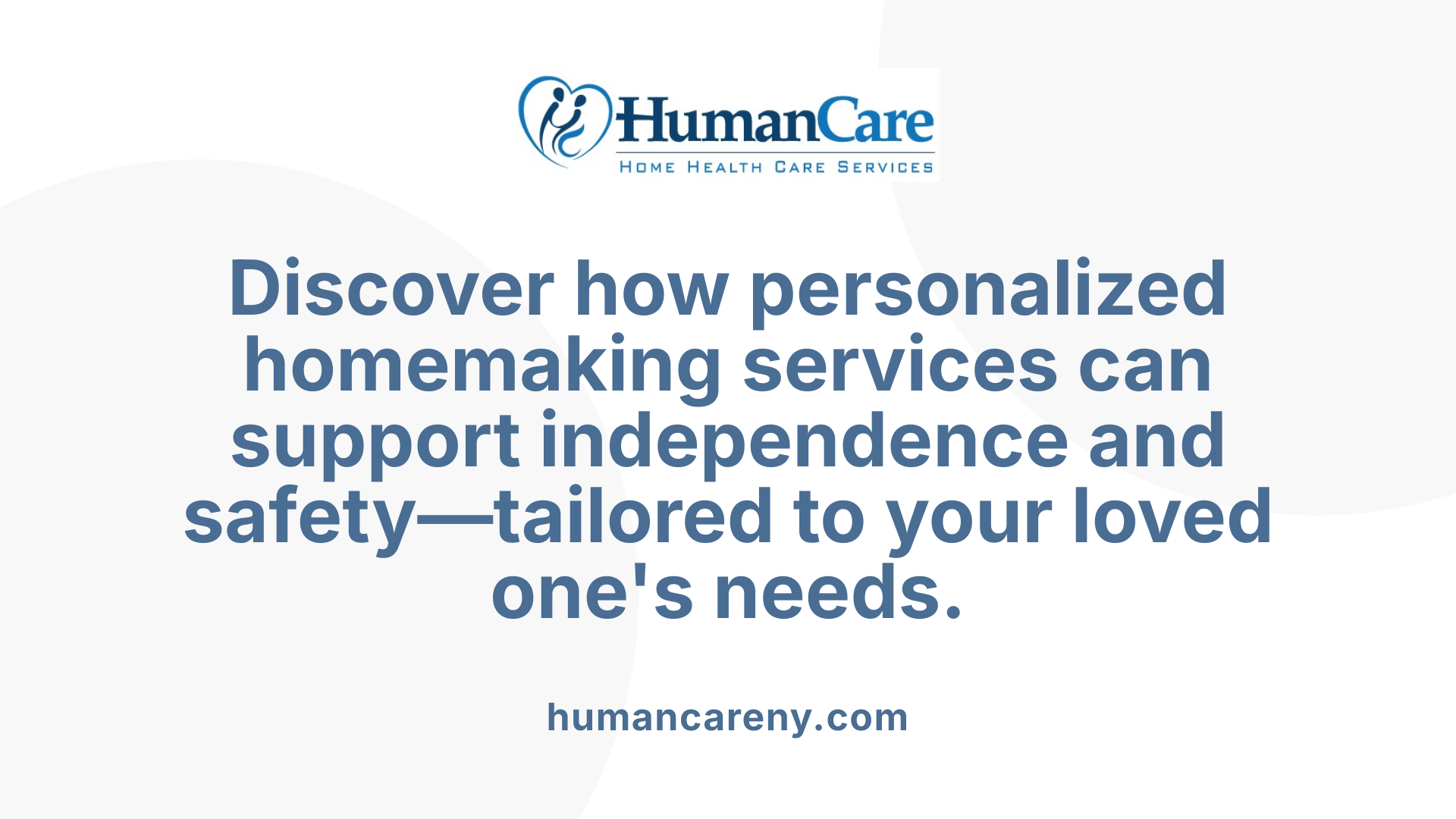Empowering Elderly Individuals through Homemaking Services
Homemaking services are a vital component of in-home care that significantly contribute to maintaining safety, independence, and quality of life for elderly individuals experiencing cognitive decline. As age-related issues such as dementia or Alzheimer’s affect memory and physical ability, tailored homemaking support ensures that seniors can continue living comfortably and with dignity in their own homes. This article explores the multifaceted roles of homemaking services, safety strategies, caregiver support, and practical tips to optimize care for seniors facing cognitive challenges.
Personalized Support and Tailored Care Planning

How do homemaking services support elderly individuals with cognitive decline?
Homemaking services are designed to help seniors facing cognitive decline by offering personalized assistance with daily routines and household tasks. These include help with bathing, dressing, grooming, meal preparation, medication reminders, and light housekeeping like cleaning and laundry. Such support ensures the individual's safety and comfort, reducing hazards like falls or accidents.
A crucial aspect of these services is their tailored approach. Caregivers are often trained specifically in dementia care to understand the unique needs of these individuals. They create customized care plans that focus on minimizing household dangers, establishing consistent routines, and promoting independence. These personalized plans help keep the environment safe, familiar, and manageable for the senior.
Beyond physical assistance, homemaking services also provide companionship and emotional support. This can help mitigate feelings of loneliness and improve overall well-being. The presence of trusted caregivers often creates a comforting atmosphere, which is beneficial for mental health.
Furthermore, homemaking services ease the burden on family caregivers. By taking over daily tasks, these services offer respite, allowing family members to recharge and better support their loved ones.
In summary, homemaking services support elderly individuals with cognitive decline by ensuring safety, promoting independence, and enhancing emotional health. Tailored to each person’s background and needs, these services help seniors maintain dignity within their own homes.
What are the benefits and roles of homemaking services in aiding seniors with cognitive challenges?
Homemaking services play a significant role in supporting seniors with cognitive challenges. They enable individuals to live in their own homes safely and comfortably, which is fundamental to preserving their independence and quality of life.
These services provide customized assistance with everyday activities such as meal preparation, medication management, and household chores. By doing so, they help reduce safety risks like falls, poisoning, or confusion caused by disorganized environments.
Beyond physical safety, homemaking services deliver cognitive stimulation through structured routines and social interactions. Engaging in regular activities and maintaining a familiar environment can lessen feelings of loneliness and reduce agitation common in dementia cases.
Monitoring and early intervention are additional benefits. Regular visits help identify signs of worsening health or safety issues early, preventing complications. Consequently, many seniors can continue living at home longer, delaying or avoiding institutional care.
Emotional support provided by these services contributes significantly to mental health. Caregivers build trusting relationships, offering reassurance and companionship that positively impact mood and cognitive function.
Overall, homemaking and in-home care are vital in improving overall health, safety, and emotional well-being for seniors dealing with cognitive challenges. They help foster a supportive environment where seniors can maintain autonomy while receiving necessary assistance.
Creating a Safe and Supportive Home Environment

How can caregivers create safe and supportive home environments for the elderly with cognitive impairment?
Creating a safe and supportive home for seniors with cognitive issues involves several careful steps. Caregivers should begin with a thorough room-by-room safety assessment. This process includes checking for hazards such as loose rugs, clutter, poor lighting, and unsafe furniture arrangements. Eliminating these risks is vital for preventing falls and injuries.
Simple modifications can make a significant difference. Clear signage with pictures and labels can help seniors find and identify objects easily. Using contrasting colors on walls, furniture, and floors improves visibility and helps reduce confusion. Securing sharp furniture edges and removing tempting hazards like small objects or choking risks supports safety.
Safety devices are essential components of a secure home. Install grab bars in bathrooms, use smoke and gas detectors, and place nightlights in dark areas. Locking cabinets or storage areas that contain medications, cleaning supplies, or other dangerous items prevents accidental poisoning or misuse.
Applying universal design principles also enhances safety and independence. Ensure good lighting throughout the home and keep pathways clear of obstacles. Fixtures and furniture should be easy to operate and accessible. Regular maintenance and testing of safety devices are crucial.
Encouraging familiarity through signs, landmarks, and consistent routines can boost cognitive comfort. Limiting access to hazardous areas and items—such as stairways, sharp tools, or electrical cords—adds an extra layer of security. Using safety technology, like motion-sensor lighting or emergency alerts, can provide peace of mind for caregivers.
Regularly reviewing safety measures and involving residents in activities that promote cognitive engagement help maintain a secure, supportive environment. These advances allow seniors to retain independence longer while enjoying a safer living space.
How does homemaking support the independence and well-being of elderly individuals facing cognitive issues?
Homemaking tasks are more than chores—they are vital to maintaining independence and emotional well-being for seniors with cognitive challenges. A well-organized, safe home environment allows older adults to perform daily activities with less risk, preserving their dignity and sense of control.
Key to supporting independence is creating an accessible and hazard-free space. This includes adjusting furniture, installing safety features, and ensuring pathways are unobstructed. Incorporating assistive technology, like medication reminders or automated lighting, helps seniors manage their routines.
Routine activities such as cooking, cleaning, and laundry not only maintain hygiene but also foster a sense of normalcy and purpose. When caregivers assist with homemaking tasks, they help reduce the risks of accidents and health deterioration due to neglect or unsafe conditions.
Personalized support tailored to each individual's needs involves family, community resources, and professional caregivers. This approach ensures that seniors remain engaged, participate in social activities, and pursue hobbies that stimulate mental health.
In summary, thoughtful homemaking—through safety modifications and routine management—enables older adults to retain their independence longer, supports emotional health, and provides a foundation for a better quality of life despite cognitive declines.
Supporting Caregivers and Leveraging Resources

What practical tips can caregivers use when utilizing homemaking services to assist seniors with cognitive decline?
Caregivers play a vital role in maximizing the benefits of in-home care services for seniors experiencing cognitive decline. Establishing consistent routines is paramount; this helps the senior anticipate daily activities such as bathing, dressing, and meal times, which can reduce confusion and anxiety. Clear communication tailored to the individual's comprehension level also fosters cooperation and safety.
Assessing the home environment for hazards is essential. This includes removing clutter, installing safety features like grab bars and stair rails, and using safety devices such as motion-sensor lighting and medication reminders. Monitoring medication management and ensuring proper adherence reduces health risks.
Coordination with healthcare providers can inform adjustments in care plans based on the senior’s evolving needs. Utilizing community resources, such as support groups or health agencies, provides additional guidance and emotional support.
Caregivers should thoroughly interview service providers, review credentials, and check references to ensure reliability and suitability. Sharing personal and medical background information with providers enables personalized care.
Creating individualized care strategies that address behavioral challenges and promote engagement in daily activities helps maintain dignity and independence. Using remote monitoring technology, including telehealth options, allows caregivers to stay informed and respond swiftly to emergencies or changes in condition.
Integrating these strategies ensures that homemaking services effectively support seniors and ease caregiver responsibilities, enhancing overall quality of life.
How do resource centers and support groups benefit caregivers of seniors with cognitive impairments?
Caregivers of seniors with cognitive impairments benefit significantly from the resources and community support found through dedicated centers and groups. Caregiver Resource Centers (CRCs) serve as hubs of specialized information, offering personal consultations, comprehensive care planning assistance, and referrals to community services tailored to Alzheimer’s, stroke, and Parkinson’s disease. These centers help caregivers navigate complex medical and legal considerations, alleviating stress and uncertainty.
Support groups, whether in-person or online, provide a space for caregivers to share experiences, exchange practical advice, and gain emotional encouragement. Connecting with others facing similar challenges reduces feelings of isolation and fosters a sense of community.
Participation in professional training workshops equips caregivers with skills necessary for long-term management, including legal planning, medication management, and behavioral strategies. Legal and financial advice ensures proper power of attorney arrangements and estate planning, which are crucial for ongoing care.
Educational programming enhances understanding of cognitive disorders, improving caregiver confidence and competence. This comprehensive resource network promotes resilience, reduces burnout, and helps caregivers develop effective coping mechanisms.
| Resource Type | Benefits | Examples |
|---|---|---|
| CRCs | Personalized guidance, care planning, referrals | Care management support, diagnostic info |
| Support Groups | Emotional support, shared experiences | Online forums, local caregiver groups |
| Workshops | Skill development, legal/financial knowledge | Long-term care, dementia management |
| Professional Counselors | Emotional relief, stress management | Individual, family, or group therapy |
Altogether, these resources empower caregivers to provide better care and maintain their well-being, ultimately benefiting the seniors they support.
Enhancing Quality of Life Through Proactive Homemaking Support
Homemaking services are a cornerstone of effective in-home care for seniors with cognitive decline. By offering personalized assistance, creating safe living spaces, and supporting caregivers, these services play a vital role in fostering independence, safety, and emotional well-being. Implementing strategies like home safety modifications, establishing routines, and leveraging community resources can significantly improve the daily lives of seniors. Ultimately, a comprehensive approach to homemaking not only helps elders retain their dignity and autonomy but also provides peace of mind for families and caregivers, ensuring that elderly individuals with cognitive challenges enjoy a higher quality of life in a secure, nurturing environment.
References
- In-Home Care
- Tips for Caregivers and Families of People With Dementia
- Caregiver Resource Centers - DHCS - CA.gov
- Creating Memory-Safe Spaces: Homemaking Tips for Seniors ...
- Caring for Older Patients With Cognitive Impairment
- Supporting Seniors with Daily Homemaking Tasks
- In-Home Care
- Home care for the elderly with dementia: a systematic review



